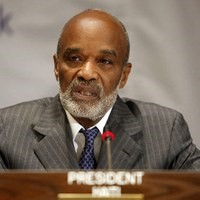Porto Príncipe (Haiti), 1943
By João Alexandre Peschanski
Elected president in early 2006, René Préval has a long and ambiguous political trajectory. An agronomist by training, he fought alongside then-priest Jean-Bertrand Aristide in the resistance movements against the dictatorship of Jean-Claude Duvalier (1971-1986). When Aristide, known as “Titid,” was elected president in 1991, Préval took on the role of prime minister. At that time, they were not only close friends but also trusted allies. Both fled the country after the military coup that deposed the government in 1991.
Aristide returned to Haiti in 1994 after a stay in the United States and remained close to Préval, endorsing him as his successor from the Lavalas party. The former prime minister won the elections and attempted to form a coalition government that would unite the different social sectors of the country. On one hand, he maintained Aristide’s political project, including the privatization of parts of the public sector under pressure from the International Monetary Fund (IMF) and prioritizing free trade over Haiti’s economic development. On the other hand, contrary to the demands of the U.S. government, he reestablished diplomatic relations with Cuba and encouraged exchanges with Caribbean countries. However, his attempt to unite the different social sectors ultimately failed.
His term, which ended in 2000, was marked by significant turbulence, beginning with the rift within Lavalas between supporters and critics of Aristide. This division was felt in his government, and Préval tried to maintain a balance between rivals as best he could. By the end of his term, he aligned himself with Aristide, who became prominent in his government. In 1999, Préval dissolved Parliament to ensure the appointment of a prime minister backed by Aristide. The United Nations (UN) criticized this decision. Préval was the only elected Haitian president to complete his term as scheduled and without interruption.
When Aristide reassumed the presidency in 2001, Préval maintained a discreet attitude. He did not break with the government, which faced criticism from various sectors of society, but he also did not participate in it. From the foreign troop occupation of Haiti in February 2004 until the campaign for the presidential elections two years later, Préval was not prominently featured in the country’s political news. He did not participate in debates or present a political program for the new government.
René Préval took office with the challenge of combating Haiti’s historical rates of violence, corruption, and poverty, and of rebuilding the country’s institutions. The president initiated numerous reforms, privatized several state-owned enterprises, and closed an energy pact with Venezuela through an agreement with Petrocaribe, securing fuel at preferential prices and favorable financing conditions. In 2008, Haiti joined Cariforum, a cooperation group comprising sixteen Caribbean nations.
However, the country suffered from various natural disasters that exacerbated its already concerning situation of poverty and social instability. Between 2007 and 2008, Haiti was hit by five hurricanes. The destruction they caused led to a food crisis marked by looting and rebellions against the government. In 2010, a violent earthquake left the country without electricity, potable water, or basic sanitation, killing at least 270,000 people and affecting approximately 3 million Haitians. Around 20,000 troops from ten countries arrived on the Caribbean island to assist in peacekeeping efforts and distribute water and food until a minimal degree of stability could be restored.
Préval requested that the United Nations Stabilization Mission in Haiti (Minustah) not confront the gangs before an attempt at government negotiation, which ultimately failed. The actions of the Mission’s soldiers are monitored by representatives of Human Rights. In 2010, Mercosur decided to grant tariff preferences to the country until 2019.
The 2011 elections took place amid tension and an epidemic of cholera. The initial results indicated the need for a second round. A mission from the Organization of American States (OAS) was called in to oversee the vote counting. Thus, the legitimate transfer of power took place with Michel Martelly, the opposition candidate who was elected president, succeeding René Préval.



